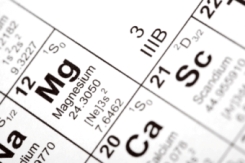Magnesium Deficiency and Insomnia
Sleep deprivation can be an insidious problem that has numerous knock-on health effects. Many other conditions and pain symptoms can be caused or exacerbated by lack of sleep. Those who suffer from chronic insomnia try many remedies and tactics to improve the quality of their sleep such as reducing caffeine intake or changing nighttime routines. One possible cause that can be overlooked though is a magnesium deficiency. Some people do report that when they start taking magnesium supplements then the quality of the their sleep can improve significantly.

Magnesium Relaxes Your Brain and Body
To fall asleep, our bodies and brain relax and go into a ‘hibernation’ state. On a more biochemical level, magnesium activates the parasympathetic nervous system, which is responsible for getting you into a calm and relaxed state. It regulates the neurotransmitters as well as hormones that regulate sleep-wake cycles (vasopressin). It also binds to gamma-aminobutyric acid (GABA) receptors, which are responsible for lowering nerve activity leading to greater sense of relaxation.Magnesium Deficiency Interferes With Sleep
As magnesium is responsible for initiating sleep in our bodies, groups of people with magnesium deficiency often report trouble sleeping or insomnia. Low levels of Magnesium can be associated with:• Digestive diseases: Quite often, digestive diseases inhibit the absorption of food particles, vitamins, and minerals, resulting in deficiencies.
• Diabetes: Magnesium deficiency is also directly linked to Insulin resistance and diabetes. We have the mineral being expelled out frequently during urination.
• Alcohol dependence: In general, alcohol prevent absorption of vitamins and minerals alike, therefore people who heavily drink are likely to suffer from magnesium deficiency.
• Age: Something out of our control, as we age, so does our cells and some of the cellular mechanisms slow down considerably. The absorption rate of magnesium from the diet is reduced in the elderly, leading to deficiency.
Magnesium Regulates Sleep Quality
Not only does magnesium lay a crucial role in helping you sleep, but also deeply influences the quality of sleep you get as well. The quality of sleep is directly influenced by the volume concentration of magnesium in our blood. Magnesium’s influence in the nervous system tends to block ‘exciting’ molecules from binding to neurons, and as a result, the nervous system relaxes.Magnesium Alleviates Anxiety and Depression
Both anxiety and depression heavily weigh negatively upon sleep. Coincidentally, magnesium alleviates both mood disorders making it an effective countermeasure. During magnesium deficiency, instances of depression, anxiety, and mental confusion are often seen and reported.Emerging research has also indicated magnesium could potentially enhance conventional mood disorders treatments. It is believed that this is due to magnesium’s ability to calm the nervous system. Therefore, if you lack sleep or insomnia is as a result of mood disorders, then incorporating magnesium into your regular treatment may be suggested by your healthcare professional.
Recommended Magnesium Dosage to Help With Sleep
The Institute of Medicine has offered clear guidelines on the recommended daily dietary intake of magnesium. For adult women, a value of 310–360 mg of magnesium is ideal and 400–420 mg for adult men.Magnesium is readily available in the food we eat and there may be trace amounts in the water we drink. Leafy green, i.e., spinach, whole cereals (unprocessed and unrefined), nuts, fish and certain fruits are high in magnesium and their inclusion in the everyday diet is recommended.
The most important aspect is try and ensure you get magnesium, naturally, from whole food before attempting any form of supplementation. However if your diet is insufficient in magnesium then supplements may be beneficial. Some supplements come in specialized structural forms that make them easily absorbed by our bodies, while others are slow releasing, some contain blends of other trace elements like calcium and potassium. In treating insomnia though magnesium supplementation, no accurate recommended levels are outlined, however, there are some suggestions that you may require about 350 mg per day.
Considerations When Taking Magnesium Supplements
The first step towards countering sleep problems should first involve lifestyle interventions like cutting back on your caffeine intake, establishing a regular bedtime routine, eating and avoiding screens an hour or two before bed.If all goes well, then you wouldn’t need magnesium supplementation, however, if you’ll still need it, then you should take a few things into consideration: First, magnesium upper limit levels is 350 mg per day and supplementation may have side effects, like nausea, diarrhea, and cramps, but these are mild. Also, magnesium reacts with certain medication, including antibiotics, antacids, muscle relaxants and hypertension medications.
It is always suggested that you consult with your doctor before you attempt any magnesium supplementation, particularly if you are taking other medications.
